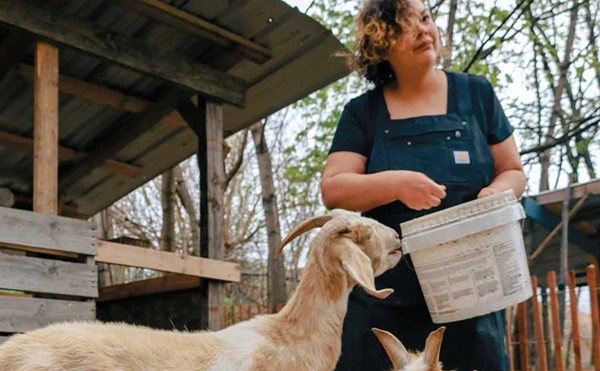"These Detroit-bred cuties are so goddamned good ... Think '60s Brit-pop with bluesy piano strut and raggedy garage-rock thrown in for good measure. [The song] 'Well Well Well Well' is our new theme song."
Those words were written on Rolling Stone's website in November 2006 as part of the magazine's recurring "Hot Band Preview." The writer was describing the Satin Peaches, a quartet that many Detroiters may have never heard of, and if they have, they probably don't know much about the band's storied past ... or present.
Nearly a full year later, Teen Vogue also weighed in on the Peaches, hyping them as "just-out-of-high-school fellas from Detroit," cute dudes all, who "came through New York City a few weeks ago and totally rocked the Mercury Lounge with their Velvet Underground-flavored garage rock."
There's little doubt that if Jane Pratt was still editing Sassy magazine and preaching to modern teenyboppers and aspiring riot grrrls, the Satin Peaches would be part of that magazine's "Cute Band Alert" section.
Not that one of Detroit's finest was striving to be a group that would've fit into the pages of 16 Magazine if that publication was still in print.
"It just kinda happened," admits George Morris, the Peaches' lead vocalist, rhythm guitarist and primary songwriter. "We started out when we were like 17, and people were writing about us when we were 18 or 19. So we did really get these 'teenage young-kid rock' kinda write-ups. 'These cute little kids from Detroit.' It was a little annoying at first. But after the NME British tour, they stopped writing about how we were cute little kids."
Indeed, it was about that time that Britain's longtime pop-music bible wrote of the band: "Forget the greased-up garage rock and proto-punk of the Stooges and the White Stripes. The Satin Peaches are Motor City's new favourite sons."
In other words, this band deserved to be taken more seriously than those early reports suggest. So we apologize for leading this piece with references to that initial fawning, though it is part of the Peaches' history. The truth is, however, rock 'n' roll was originally meant for teenagers and there shouldn't be anything novel or unusual about kids playing it. Elvis was barely 19 when he began recording for Sun Records; George Harrison turned 21 the same month the Beatles came to America to play Ed Sullivan. Johnny Rotten was 19 when he joined the Sex Pistols. And then there were early artists like Richie Valens and Eddie Cochran who scored their hits when they were still teens themselves.
But over the last several decades, thanks to boy bands and pop "phenomenons" like Britney Spears, young people playing music are considered either a novelty or manufactured a la the Archies. Disney Mouseketeers have gone on to make pop record hits throughout history, dating back to the original '50s TV show; the big difference is no one ever took records by Annette Funicello or Paul Peterson the least bit seriously. Pundits have long made a big deal about Avril Lavigne writing and "rocking" at such a young age when, at her same current age, Paul McCartney was already working on the Revolver album; Ray Davies was long past "Waterloo Sunset."
All of which is to illustrate how expectations have been lowered over the years and to once again point out there's nothing novel about "youngsters" playing rock 'n' roll. Besides, the Satin Peaches aren't exactly teenagers anymore anyway; all four members turn 22 sometime this year. In fact, Morris's 22nd birthday was the day after the quartet sat down with Metro Times at Jacoby's downtown in late February, the plan being to celebrate with a show at Mac's Bar in Lansing the following night.
But make no mistake about it: The Peaches play genuine rock 'n' roll ... great rock 'n' roll, in fact. It has roots in all the right places (they're frequently compared to the aforementioned Mr. Davies and his band the Kinks, even if a few band members say they're not sure why). It has musical dynamics, with softer passages often building and then exploding in crescendos. And the only reason many familiar with the Detroit rock scene may be unfamiliar with this band is that, not long after forming, the Satin Peaches were off to England to become "rock stars" there.
The group landed in the UK after they came to the attention of a Welsh manager named Marcus Russell, who also manages a little-known band from Manchester, England, called Oasis. Russell, who also manages Crowded House and is responsible for taking the Gallagher Brothers to the heights of rock 'n' roll superstardom, signed the Peaches — well, in truth, it was "a handshake deal" for two years before they actually inked a paper contract — and then got them a record contract with Island Records in the UK. There was a huge advance and "a shitload of money," says George, to record their first disc, even though no one's eager to reveal exactly how much money that was (and who can blame them?). This was all before the bottom fell out with Island. But more on that later ...
The Peaches' career trajectory took the same route as many Detroit bands before them. Three of its members — Morris, lead guitarist Ryan Wiese and drummer Jeremy Smith — have been friends since childhood, attending high school in Commerce Township, playing hockey and performing in bands together since they were pre-adolescents. In fact, they first discovered their mutual love of music during a hockey league meeting. Morris's dad played in several popular local cover bands at the time, and Pop Morris frequently let his son's fledgling group open shows for them.
"We'd play Led Zeppelin stuff," George says, "and he would get us into the bars when we were 14 and 15. We'd open up for them. And then we'd sit there and watch them and everyone else drink beer. And then when it was like 2:30 in the morning, we'd pack everything and have to load the truck."
"We were their roadies," drummer Smith says.
"But we were playing hard at 14, so ..." says Morris.
"We got a lot of knowledge from your dad's band," acknowledges guitarist Wiese.
Bassist Aaron Nelson, meanwhile, was growing up in Petoskey, a self-described "big loser in high school. I didn't have any friends. I didn't talk to anybody in school." He claims he wasn't even one of those archetypal "bedroom" rock 'n' roll kids. "No, I didn't actually even play an instrument," he says. "I just sat in my room and talked to people on the Internet. For about four years."
In fact, the bassist never picked up an instrument until the Satin Peaches "officially" formed in 2004, following Nelson's relocation to the Detroit area. That's an interesting and pertinent fact because the band has an incredibly tight and intuitive rhythm section today. "Well, we both really like mathematical games," explains drummer Smith. "So everything's very precise with us. He's got a good groove and I can feed off of that, and vice versa."
It should also be noted that guitarist Wiese was a bass player and had never really played guitar until he was needed on that instrument to complete the Peaches. In other words, he's only been playing those stunning and melodic guitar lines for about five years.
The original lineup of the Peaches was co-led by another high school chum, Jesse Shepherd-Bates, who currently leads Detroit's JSB Squad, as well as playing bass with Mick Bassett & the Marthas.
The band played its initial gigs at such places as Small's and the Elbow Room before heading into the studio to record their "demo" album, The Apple Overload. It was that recording that brought them to the attention of both manager Russell and Island Records. All the members would subsequently drop out of their first year of college to pursue their musical dreams.
"The strength and spirit of The Apple Overload is what initially attracted me to them," says the UK-based Russell, who was originally introduced to the demo by a British A&R man who'd flown to Detroit to see a Peaches show after hearing the tapes. "Subsequently, though, it was their pure love and passion for what they do. They have an unshakable commitment and desire to succeed. And in my experience, the route to success is almost always more of a marathon than a sprint. I've always believed the Satin Peaches have the talent and stamina to come good."
Friction grew, however, and Shepherd-Bates exited the Peaches soon thereafter; only one song from that record remains in the band's current repertoire.
It wasn't a totally amicable split at first. "I just don't think that my and Jesse's ego could coexist peacefully in the same band at that point in time," Morris confesses. "But after a while, he kinda saw what we thought and understood why we did what we did. Now everything's totally cool."
In fact, everything is so "cool" now that the members of the Peaches play as part of the Zappa-esque JSB Squad whenever they're available. Two nights before the dudes met up with Metro Times at Jacoby's, the Peaches opened for Shepherd-Bates' musical ensemble at a way less-than-packed Magic Stick downtown. The Peaches put on an incredibly good show, full of those aforementioned dynamics and crescendos. Their repertoire has grown to be so good that one of the evening's finest songs — probably the best tune performed all night, in fact — "Screaming Easy" (which Morris introduced as being a "song about sex") hasn't yet been recorded for commercial release by the band.
With long hair and "rock star" stances, plus terrific showmanship (which the members once again credit Morris' father with helping them develop, although they all emphasize that the song is still the most important element), the Peaches come off as brilliantly retro without being retro at all. This was especially driven home when the set ended with Smith's drum solo (!). Slowly but surely, nearly one-third of the audience ended up onstage — including trombone, other brass instruments and the Hard Lessons' Augie joining Smith on a second drum kit — merging into the JSB Squad, which kicked off its set with a cacophonous cover of Zeppelin's "Moby Dick."
But Zeppelin allusions aside, like so many great bands before them, it was their discovery of and love for the Beatles that took the Peaches in a totally new direction. Morris — who writes most of the material, though guitarist Wiese is currently writing a lot more — acknowledges a fondness for early Brit-pop, including the Who and early Stones (though "the later Stones, not so much"). And then it was the Velvet Underground that really changed everything. A hybrid of those two bands is a perfect description of the Peaches' sound. (The band is especially amused to hear from this old rock historian at Jacoby's that Beatles manager Brian Epstein once made an overture to the Velvets about managing Lou and crew.)
"Things really did change when I was 16 or 17 and I discovered the Velvet Underground. That definitely changed the way I write songs," acknowledges Morris. "It showed me that you can do all these weird kinds of things, and even this dirty thing, and it's all still cool."
Wiese adds another legendary songwriter to their list of influences: "One of the big things for me — like with rhythms and good solid melodies — was Burt Bacharach's stuff. My dad definitely got me into a lot of his stuff early on and I've always been a really big fan. All his stuff is just so cool." It's an influence they share with that other band managed by Marcus Russell; there was even a photo of Bacharach featured on Oasis' debut album.
But it was still Lou Reed's early music that sunk into Morris' young psyche, to the point that he acknowledges the Velvets as the catalyst in naming his own band. "Yeah, I really wanted a name like the Velvet Underground," he says. "So one day, I was listening to them while I was eating peaches. And the Satin Peaches just immediately came to mind." He laughs. "I figured if it's not terrible, then it's good."
Such happenstance runs throughout the Peaches' history. When asked the origins of the title of their mini-album, Morning Maid — the one they recorded for Island UK but the label never released — Wiese responds, "It was just from a dream I had where someone told me, 'This is your morning maid. She'll give you anything you want.' Which I, of course, thought was awesome."
"Really?" Nelson asks. "I always thought it was in reference to that cute maid Julia who cleaned our rooms when we were living in the mansion."
The mansion to which Nelson refers is the mountaintop studio in upper New York state, near Woodstock, where the label housed the band with producer Owen Morris (Oasis, the Verve ... and no relation to George) to begin production on the mini-album. The producer got amazing music out of the boys, including their piano-meets-distorto-guitar anthem, "Well Well Well Well," and a distinctive ditty called "Nothing We Can Do" that kicks off with a quote from Nino Rota's "Love Theme from Romeo & Juliet" (which the band discovered on an old music box). The producer put them in a huge room, with each member playing through two amps at the same time. And the takes were all recorded live. "There was just immense sound in that room," recalls Wiese. "We recorded that record so loud!"
But thanks to the numerous, um, libations and party favors producer Morris had delivered to the top of the mountain in the dead of winter, things went awry on the sessions fairly quickly.
"Owen was a bit of a lunatic but I mean that in a good sense," George says. "He's probably the closest we'll ever get to meeting Hunter S. Thompson. That's pretty much all I can say, but can you imagine?"
"It's almost like we had too friendly of a relationship with our producer," Wiese adds. "It was sort of like, 'Well, we're all alone up here on this mountain ...' He really did teach us a lot. But no work and all fun [doesn't make a record company happy]."
The label eventually moved the band to Los Angeles and put them in the studio with another producer, Dave Sardy (Supergrass, Red Hot Chili Peppers), to record two more tracks and to remix several of the tunes they'd recorded with Owen. "It was like night and day," Morris says. "Your typical artist-producer relationship. It was actually very cool."
"He'd just had a kid a few months prior to us coming there," Wiese says, "so he might have been in a state of downtime for this particular recording, with starting a family and all."
Finally, with six songs recorded and ready to go, it then became a "hurry up and wait" scenario for the Peaches. In what is a fairly common story, the band's A&R representative was dismissed from the label (he now works for Marcus Russell's management company) and the group no longer had a champion at Island. This was just as the band was ready to decide what Universal Records-based label they'd like to be on in this country.
"Things got ugly with the label really quick," Morris says. "So the first six months, it was kinda like, 'Oh, this is amazing. I can't believe we're doing this!' And then it became, 'What the hell is going on here? This is ridiculous!'"
"Everything kind of peaked," Wiese says. "That Rolling Stone thing and it was all going good. Everyone was anticipating the release. Like, 'Here we go, let's do it.' And then nothing happened. So all the buzz kinda slowly went away and we were like 'Hey, let's release this!' And they never released it. And then it was like every time we went over there [the UK], we had to rebuild the buzz all over again. So it was really frustrating."
Morris: "In retrospect, it's probably good that it happened that way, because we really weren't ready. They signed us when we were 19 or younger and we immediately went from playing Detroit clubs — the Lager House and shit — to playing the London Astoria. We weren't a good enough band yet. But we definitely learned a lot from it and we're a better band because of it. I don't think it would've worked at that time even if they had put out the record."
Nevertheless, the guys did have mostly positive experiences in the UK, where all things Detroit are still basically viewed as "cool," even if no band has broken out of here in quite a while. "They still look at us as a breeding ground for great music over there," Morris says. "Detroit definitely still has a name in Britain and the city's still known for its attitude. In fact, I think people are a little afraid of it over there — but in a good way."
Wiese: "The biggest question was always 'Have you ever been to Eight Mile?'"
"Yeah," Morris says, "and we'd always say we smoked crack on Eight Mile."
"But that's Eight Mile in Roseville!" Smith laughs.
The Island Records experience also bonded the band and their friendships tightened. If they're in a room with a large group of people, the guys explain, they still end up gravitating to, hanging with and talking to each other. Not a day goes by, even when they're off the road, that they don't want to get together to drink and shoot the shit.
One positive thing that arose from the Island deal, in addition to their association with a famous and gifted manager, was that they got picked up by a high-profile booking agency in Texas. Before that, they did an NME British "Freshers" tour with the Go! Team (which was, in fact, a terrible fit; the band never realized how important matching genres was until they were set to open a show for the Raveonettes in London, the headline band had to cancel, and the fans who showed up still appreciated the Peaches' sound). After that, the band spent the latter part of last year opening an American tour for the great Alejandro Escovedo. And even though they were often playing to audiences "old enough to be their grandparents," the Peaches found Escovedo's fans to be both receptive to and appreciative of their music. The guys were also thrilled to be hanging with the "very cool" artist who entertained them with stories of his punk rock days and hanging with the Sex Pistols. And then there was just some good old fatherly career advice.
Wiese: "He asked us, 'Hey, you guys got girlfriends back home?' and we were all like, 'Yeah.' And he was like, 'Well, you know, I've been married about three times.' And we were like, 'About? You don't remember how many times you've been married?' He just smiled and was like [very Zen-like], 'Well, y'know, it's a beautiful thing.' But he kept telling us that when you're touring all the time, it's just not worth getting involved in a relationship." (For the record, all of the guys, except Morris, still have significant others here in Detroit ... which led to a running joke throughout this interview — relating to things that happen on the road — that the headline of this story should be: "We all have girlfriends so please don't print that ...")
Truthfully, Metro Times came into this story expecting it to take a totally different slant. The anticipation was for a story more about bitter defeat, of what a band does — and what little options may be available to it — after the bottom falls out and they lose a major label deal.
Instead, it's a story of optimism. These guys are very positive and hopeful about their immediate future. The good news is they're still managed by Russell; that says a lot because the music is that good. And not only did they not have to return the "shitload" of money originally advanced by Island but the label also returned the band's master tapes for the boys to do with them as they please. That's pretty unusual in the corporate music biz game — revealing much about manager Morris — but the guys are releasing Morning Maid for the first time in the United States this week, complete with a record release show at Ann Arbor's Blind Pig. The album will be available digitally, as well as on disc at all their live shows.
"After you've actually been on a major label, you realize it can be better not to be on a label at all," Smith says. "But Marcus told us how to get out of it and the proper way to go and it worked."
"After mass personnel changes, the label went missing in action, so the least they could do was return all the goods to their rightful owners," says the manager of the parting deal. "And the least I could do was get it all back for them. This kind of nonsense sometimes occurs when a major label experiences a self-induced meltdown. But we've moved on. We're excited by the future and look forward to forging genuine partnerships, based on honest endeavor, to help us succeed."
For their part, the Peaches have no desire to be on a major label again. And they realize, in retrospect, that with the Internet, there may be no need for major labels at all in the immediate future. "We'll definitely be a lot more careful if the opportunity ever arises again," Morris says.
"Everyone says what bull record labels are, but no one really believes it until it happens to them," Wiese adds. "And it happened to us. They want you to be a certain way. They can't play an instrument to save their lives but somehow they all know the best songs, how you should play them, and in what order they need to be. It's business majors telling music majors what to do."
"A major label really is nothing but a budget," Nelson theorizes. "It's a bank. So if you're going to be on a label, it should be used for exactly what it is. What can you do for us? And what kind of budget can you offer us?"
"And if we were to do it again," Smith adds, "we definitely want to go American this time, just so there's not that continental divide, which can get very confusing,"
The Satin Peaches' immediate plans are to become well-known in Detroit, something they never had a chance to do before the British claimed them as their own.
"We've learned so much and we can kinda take that all home now," Morris concludes. "It's sorta like restarting all over again in Detroit, really. We were here when we started but then we basically disappeared for a couple of years. So when we got back, we were like, 'Well, now we know exactly how to do it,' and now it's time to make some noise in Detroit. We haven't really been concentrating on anywhere else but Detroit right now. We're still really young so it's cool that we can actually start again. And the truth is we wouldn't be the band we are now if we hadn't gone through all those crazy things."
Download a free Satin Peaches track, Screamin' Easy.
The Satin Peaches' record release party for Morning Maid is Friday, March 27, at the Blind Pig, 208 S. First St., Ann Arbor; 734-996-8555. With Starling Electric, Mick Bassett & the Marthas and Lightning Love.
Thanks to editorial interns Julianne Mattera and Kelly Trevino for transcription assistance.
Bill Holdship is music editor of Metro Times. Send comments to mailto:[email protected]




